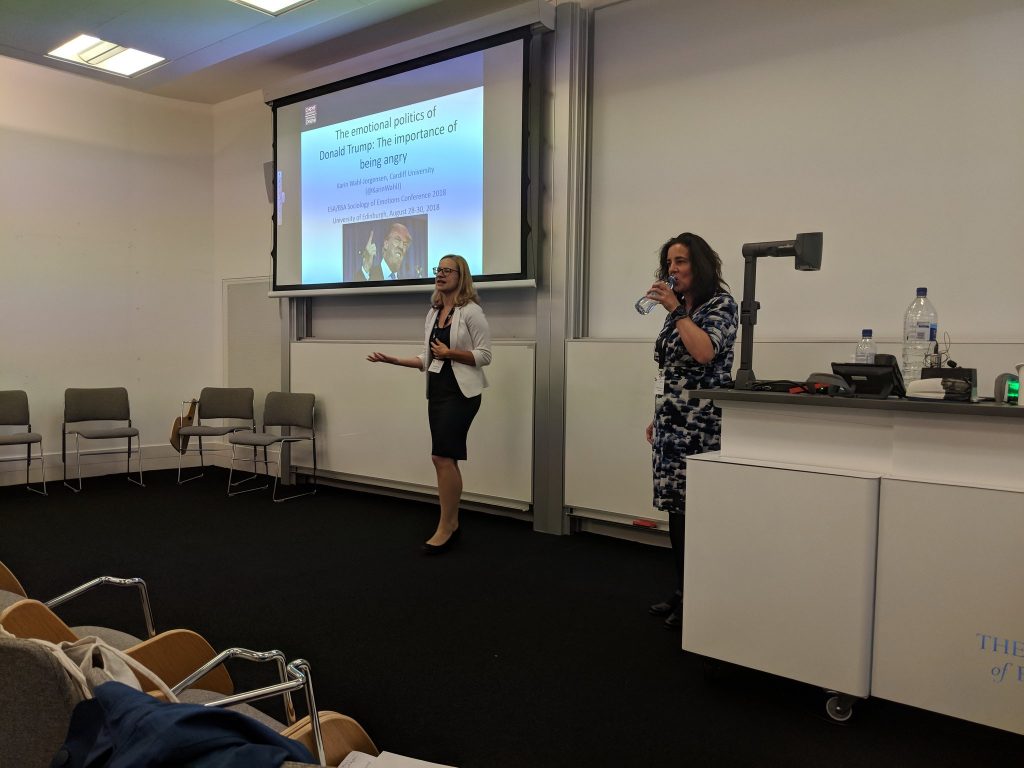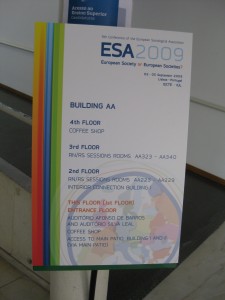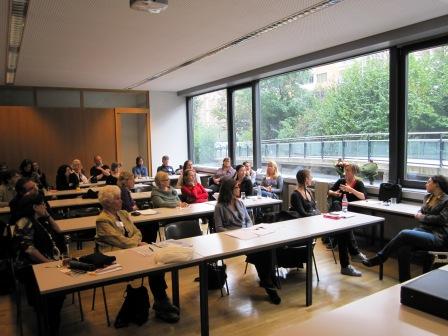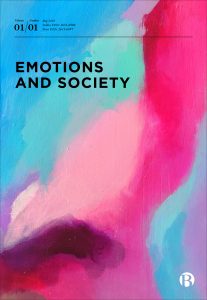The 9th Midterm Conference, 2020
REPORT_RN11_ESA_MIDTERM_Online-UB_2020_web2_____
Contribution by RN11 in The European Sociologist, issue 43, 2019
“RN Reports – RN11 Sociology of Emotions”
Jonathan G. Heaney, RN11 Coordinator 2017-2019
An Emotions Lens on the World
The sociology of emotions has grown since the 1970’s to become a vital and dynamic field within the discipline of Sociology. With strong roots in the classical tradition, it has taken an increasingly central place within contemporary Sociology and makes important contributions to general sociological theorising, as well as to specific sub-fields such as the sociology of culture, politics, organisations, social movements, intimate and family life, the body, the economy, digital sociology, social change, migration, and more. The ESA Sociology of Emotions Research Network (RN11) brings together researchers from across and beyond Europe, deploying a range of methodologies to explain and understand a – perhaps the – fundamental feature of our shared social lives: our emotions.
The RN11 was formed in May 2004, but originated as a Research Stream (RS4 – Sociology of Love and Hate: Emotions) at the 6th ESA conference in Murcia (Spain) in September 2003. Jack Barbalet, Helena Flam, and Charlotte Bloch served as the first Executive Board (2004-5), and Helena Flam would go on to serve as Coordinator of the Network on three occasions, from 2007-9, 2009-11, and 2011-12. Details on the history of the Network are available on our website.
Since then, it has expanded significantly in terms of membership and activities. Currently, the formal membership of the network stands at over 84 members, representing 25 countries in total. This includes members from across Europe, including Britain, Ireland, Germany, Sweden, Denmark, Switzerland, Finland, Israel, Poland, Portugal, Spain, Austria, Turkey, Hungry, Latvia, Russia, and many from beyond Europe, including the United States, Australia, South Africa, and Argentina. However, the informal membership of those subscribed to our email list stands at over 300 members, who, in addition to regular updates from list members, also receive our biannual Newsletter, which is currently curated by Monika Verbalyte.

Since its formation, the Network has been a key global source of and resource for emotion sociology. It has been an active participant at every biennial ESA Conference since 2003, and has organised eight midterm conferences in a variety of locations, including Augsburg, Karlstad, Budapest, Graz, Berlin, Rhodes, and Stockholm. The most recent 8th Midterm Conference was organised as a joint conference with the newly-reformed British Sociological Association’s Emotion Study Group, and took place in the School of Social and Political Science at the University of Edinburgh. This has been our largest Midterm to date with over 100 abstract submissions, resulting in 70 delegates in total over the three days of the event, 65 paper presentations, and keynotes from Professor Ian Burkitt (Bradford) who spoke on the reflexive and emotional self, and Professor Karin Wahl-Jorgensen (Cardiff), who presented on the emotional politics of Donald Trump. One key feature of this and, indeed, all of our Midterms since Rhodes, was the one-day PhD Workshop, which took place before the main conference. This year, a dozen PhD candidates from across Europe (and one from the US) had the opportunity to discuss their work collectively, and receive feedback from two established emotion sociologists, Stina Bergman-Blix (Uppsala, and former Coordinator of RN11), and Mary Holmes (Edinburgh, and Convenor of the BSA Emotions Study Group). Encouraging PhD students and early career researchers has been a hallmark of the Network since its inception, and we aim to create a warm, welcoming, and friendly environment that is also rigorous and professional, for all our members.
 PhD Workshop Lunch in Edinburgh 2018
PhD Workshop Lunch in Edinburgh 2018While conferences and critical discussion have been key activities for the Network, over the years it has also developed a very prolific publication profile. Leaving aside individual outputs, the creative collaborations associated with the network have included a series of edited editions and journal special issues, edited by and featuring RN11 members, on topics as diverse as emotions and social movements (2005), theorising emotions (2009), emotions and organisations (2010), emotions and friendship (2011), emotions in finance (2012), the internet and emotions (2013), emotions in politics (2013), power and emotion (2014), collective emotions (2014), and methods for researching emotions in sociology (2015). More recently, Network members have been instrumental in launching a new book series on emotions with Routledge (Routledge Studies in the Sociology of Emotions, edited by Mary Holmes and Julie Brownlie), a brand new journal with Bristol University Press called Emotions & Society (with members Mary Holmes and Åsa Wettergren acting as editors-in-chief, and Jochen Kleres and Nathan Manning acting as co-editors). The first issue is available for free here.
All of this attests to the thriving, exciting, and productive community that is RN11 – and our work continues. The current board, including myself, Jonathan G. Heaney (Queen’s University Belfast), along with Co-coordinators Monika Verbalyte (Freie Universität Berlin/Otto von Guericke University Magdeburg), and Alberto Martin Perez (Universitat de Barcelona) are busy marking preparations for the 14th ESA Conference in Manchester in 2019. Our involvement has already been confirmed for two Semi-Plenary Sessions for the conference, including one on boundaries, collaborating with RN20 and RN32, and another on social mobilisations, organised jointly with RN25. We also hope to collaborate with RN13 for a joint session on families, intimate relations, and emotions, in addition to our general sessions and activities. As a network, and given the centrality of our research focus, we are very much open to collaboration with other ESA Networks that are also seeking to explain and understand the emotional dimensions of social life in various ways, and to make connections with other groups and organisations that share our broad interest in the structure, dynamics, and constitution of emotional life.
____
Report from the Business Meeting at the Prague ESA Conference 2015
By: Stina Bergman Blix
The last midterm conference on Rhodes amounted to 36 presentations, a PhD workshop with Helena Flam and Helmut Kuzmics and a workshop on analyzing fiction with Helmut Kuzmics and Stephanie Bird. ESA increased the possible amount of money to apply for and the network received the maximum amount. The RN currently has 270 euros. ESA has raised the maximum amount to 2500 euros that can be applied for the next midterm.
RN Council: Before the conference in Prague there has been a lively debate among the RN representatives around the new statutes for the ESA research networks. Several RN:s have expressed concern that the statutes lead to an over-regulation of the RN:s about financial matters, rotation and continuity of board members, and how to strengthening gender equality. At the ESA council meeting the Software of the conf-tool was discussed and criticized and there was a general discontent about the timing of the business meeting. Laura Horn from the RN ‘Political economy’ was elected the new representative.
Next midterm: The meeting decided that the next midterm will take place in Leipzig the last week of August 2016.
News: The RN 11 continues to be successful with generating publications and recent new books involve: Methods of Exploring Emotions edited by Helena Flam and Jochen Kleres, and Die Ambivalenz der Gefühle [The Amivalence of Emotions] edited by Jochen Kleres and Yvonne Albrecht. Several members have been approached by publishing companies such as Routledge, Ashgate and Palgrave showing a rise in interest in research about emotions.
· Helena Flam reported that the ISA has officially received the application for status of thematic working group. A decision will be taken in April and people in the network who are members of ISA are urged to support the application (contact Helena).
· Mary Holmes announced that she and a colleague has founded a Study group of Emotion within the British Sociological Association and encourages people in the British hemisphere to join.
· Natalia Canto Mila announced a Call for papers on the sociology of emotions for the journal Digithum.
· Åsa Wettergren informed about a new graduate course on the Sociology of emotion that will start this autumn. The course is a collaboration between the Sociology Departments at the University of Gothenburg and Copenhagen University.
· Mary Homes reported on a new center for Research on Emotions in Australia set up by Roger Patulny (University of Wollongong). Invitations to join has been sent out through the Emotion google group.
Brainstorming ideas:
· Newsletter: every sixth month, to collect call for papers, conferences, present new members.
· A list on members and what we do on the homepage. This has been tried before but failed due to problems of keeping it updated. Members of the google group can log in to the google group webpage to get the email addresses of other members.
· A joint meeting with the other emotion networks in the future.
· More active in webpage, blog, twitter.
· International research funding bids as a network or some members. Send email to Jonathan Heaney and Natalia Canto Mila if interested.
Election of board: The board suggests topics and sends out call for papers for the conferences, reviews submissions, creates session structure, organize midterms (venue, food, local assistance, workshops etc.), represents the RN in the council meetings, handles finances, and writes report after conferences.
New Coordinator: Stina Bergman Blix, Researcher at Stockholm University
New Vice-coordinators: Jonathan Heaney, Lecturer at Queen’s University in Belfast and Monica Verbalyte, graduate student at Freie Universität in Berlin.
New Advisory board: Natalia Canto Mila, Katarina Scherke, Jochen Kleres and Sylva Terpe,
Juha Klemelä stays on as web page responsible and Stephanie stays on as Twitter responsible.
____
Report on the 5th Midterm Conference of the Network, Berlin 2012
Please, follow the link to view the report: Berlin Midterm 2012.
Attached here are also the “Great 3-minute Speeches” given at the Midterm!
____
THE 4th MIDTERM CONFERENCE, GRAZ 2010
Dear Members of the Emotions Network at ESA, below you will find a report from the 4th Midterm Conference of the Sociology of Emotions Research Network organized by Profs. Katharina Scherke and Helmut Kuzmics in Graz between the 29th of September and the 2nd of October 2010 at the ReSoWi-Zentrum.
On Wednesday, the29th of September we had a chance to register. The opening ceremony started at 5 p.m. We were welcomed by Irmtraud Fischer, the Vice-Chancellor of the University of Graz, Wolf Rauch, the Dean of the Faculty for Social and Economic Sciences, and Manfred Prisching, the Head of the Department of Sociology. Learning that David Hume wrote in his travelog that Styrians were rather barbaric and uglier than Tyrolians impressed us the most.
Following the welcome speeches, we were offered a real treat by Helmut Kuzmics and Katharina Scherke. Helmut raised some very poignant questions about Graz and its history which he answered with equal doses of profound information and wit. Katharina’s presentation on the University of Graz and the Department of Sociology was as funny and informative. We laughed as we learnt and learnt as we laughed. While enjoying our welcome drink, greeting old friends and meeting new colleagues, we still laughed at one or another joke cracked during their presentations. Only Jocelyn Pixley truly disagreed with the major thesis: she argued that Sydney, Australia is even further away from everything than Graz.
This past summer about 60 persons sent in abstracts for the midterm conference. In the end about 40 papers were presented. We regret especially last minute cancellations.
Conference participants were old and young, female and male, some needing 20 minutes, others 2 hours and yet others perhaps a day or two to reach the ReSoWi-Zentrum and Graz. They came from Austria, Australia, Belgium, Czech Republic, Denmark, Finland, Germany, Greece, Ireland, Italy, Israel, the Netherlands, Norway, Portugal, Russia, Sweden, and the Ukraine.
The new topics discussed this time alongside the old ones were: emotions in film, ads./culture, emotions and things, emotions and national/regime transformations, emotions during research, etc. (see the program below).
Even with 40 rather than 60 presentations, parallel sessions had to be organized, so that to our regret we could not hear everybody. The quality of presentations was very high and – as always – we enjoyed good discussions, also during breaks, which thanks to Katharina and Helmut, were also an opportunity to grab a sandwich or have a cold or hot drink.
During the business meeting Helena Flam as convener made a few announcements:
a) We received 1,500 Euro from the ESA – part of which will finance the midterm conference in Graz.
b) A proposal for a semi-plenary in Geneva was sent to the ESA in August by Helena, seconded by a few members of the executive. The ESA-coordinator asked not to inform the proposed speakers about their identity in order for the ESA program committee to be able to make their choices freely.
For this reason the nominees were also not named during the business meeting.
c) The director of the Max-Planck-Institute für Bildungsforschung in Berlin, Prof. Dr. Ute Frevert, who is an accomplished historian now heading the MPI to explore emotions from a historical perspective, offered to host our next midterm conference in the fall of 2012. The MPI will offer conference rooms and catering. This news was a surprise and was greeted with expressions of joy.
In the second part of the business meeting congratulations were extended to
(i) Jochen Kleres, Tova Benski and Cas Wouters for having their articles and/or books on emotions accepted for publication,
(ii) Sylvia Terpe and Prof. Thom for having received a 3-year long research grant to do research on ‘moral emotions’,
(iii) Stina Bergman Blix /Sweden and Wenche Falch / Norway will defend their Ph.D.s in the sociology of emotions any day now,
(iv) congratulations are also due to Stephanie Baker who just got a job at the University of Greenwich / London.
(After the business meeting Silvana Greco who arrived after this meeting shared with us the good news about guest editing – with Mary Holmes – of an online journal on the theme of friendship and emotions).
It was also announced that Asa Wettergren and Jochen Kleres from our network will co-operate with Nicole Dörr from the Social Movements Network at ESA to organize at least one shared session during the conference in Geneva.
Webpage / Googlemail: Everybody was encouraged to e-mail Juha Klemelä:
jklemela [at] utu.fi
to place information about Ph.D.defenses, publications and grants, meetings, cross-national or cross-network cooperation, etc. on the network’s homepage and also to send it through googlemail to everybody. Juha noted that the previous manager of the homepage (who still is to be offered some money for his past work) would probably not be able to continue taking care of the homepage. Juha promised to contact his university about it.
In the final part of the business meeting Tova Benski told us about a collected volume on internet and emotions for which a table of contents and a partial list of authors willing to contribute already are in place. Plans for the edited volumes on emotions and (i) methods and (ii) politics were also discussed.
Most conference participants enjoyed an energetic guided tour that day that ended at a typical Austrian restaurant where all participants gathered to enjoy a great dinner which unexpectedly finished with an all-male choir singing a heart-breaking song.
The second equally exciting day of the midterm conference closed with a reception given by the Governor of Styria, Franz Voves, in the Orangerie in the Burggarten. We were all festively greeted in Austrian and English, and then treated to a buffet of very good food and wine. If the intensity of laughing, talking and crowding around tall tables (or outside – around an ashtray) is any indicator, we were simply thrilled to be at such a great reception in such a delightful company and in such an extraordinary room. Most participants continued celebrating in a nearby pub.
Post-conference discussion closed the last half-day of presentations. Several wishes and intentions were expressed:
(o) to receive e-mail addresses of the conference participants for further exchange and contacts
(i) to include representatives of other disciplines in our conferences (and also students) during the midterm conferences
(ii) for those who work with emotions and family to collaborate with the sociologists of the family – Ulla Björnberg, who heads such a RC within the ISA expressed interest
(iii) to have a major speaker open the next midterm conference
(iv) to have one or more sociologists of emotions raise specific issues or present an overview of what is happening in the sociology of emotions
(v) to find out what happens in each country in the sociology of emotions, and whether or not initiatives are on their way to organize oneself in sections or networks or to organize such within the national sociological associations
(vi) to know the schedule for organizing the ESA-sessions for Geneva (was sent last week per googlemail and is available under ESA-Geneva as well)
(Informal talks between Tova Benski and Katharina Scherke resulted in the idea of starting research on the national sociologies of emotion, and also on emotions involved in research, using our network members as members of the research team).
The conference closed with hugs and kisses and promises of seeing each other soon. Several persons expressed the wish to return to or to sign an Erasmus exchange contract on behalf of their department/university with Graz – more than adequately responding to the learning-by-laughing welcoming speeches, and the splendid and generous organization of the midterm conference by Katharina Scherke and Helmut Kuzmics for which we are all very, very grateful.
Conference participants who stayed on could enjoy the museum night (busses moving from one museum to another museum) or an open night at the opera (either ballet/dance night at practically all opera floors or Raining in the Rain the next morning).
For those who are now interested, below the Graz presenters and their presentation titles.
with best wishes,
Helena Flam
Convener of the Emotions Network
 ____
____
The Program of the Graz Conference:
Thursday, 30 September 2010
9:15-10:45 Parallel Sessions I (LS 15.02)
We-Feelings (Nations, States, Religion)
Chair: Werner Suppanz
Jonathan G. Heany (Galway, Ireland): “Human Emotions and Social Change in Ireland”
Dieter Reicher (Graz, Austria): “The Making of National Identity in TV-news Broadcasts”
9:15-10:45 Parallel Sessions I (LS 15.03)
Organizations, Professions, Work
Chair: Asa Wettergren
Stina Bergman Blix (Stockholm, Sweden): “The Interplay between Experience and Expression of Emotion”
Wenche Falch (Ostfold, Norway): “Emotional Labour in Service Encounters”
11:15-13:00 Parallel Sessions II (LS 15.02)
We-Feelings (Habitus, War)
Chair: Werner Suppanz
Helmut Kuzmics (Graz, Austria): “Affects and Sentiments as a By-Product of Mechanized Warfare on the Battlefields of the Great War 1914-1918: In Autobiographies by Officers and Soldiers of the Habsburg Army”
Sabine A. Haring (Graz, Austria): “The Development of the Images of Allies and Enemies among Habsburg Soldiers before, during and after the First World War”
11:15-13:00 Parallel Sessions II (LS 15.03)
Organizations, Professions, Work
Chair: Asa Wettergren
Charlotte Bloch (Copenhagen, Denmark): “Bullying, Bystanders, Emotions and Ethics”
Hjördis Becker (Kiel, Germany): “Simmel at Work. A Framework for Interpreting Concealment and Revelation”
Alexandra Lozinskaya (Moscow, Russia): “Museum as a text, Museum as a film: two metaphors to study emotions in historical museum”
14:30-16:15 Parallel Sessions III (LS 15.02)
We-Feelings (Collective Memory)
Chair: Helmut Kuzmics
Cas Wouters (Amsterdam, Netherlands): “On Friendship and Equality in England and Germany: Comparing Introducing and Duzen”
Anneli Meriliäinen-Hyvärinen (Oulu, Finland): “Alvivaara Area in Northern Finland: Producing the Sense of the Lost Place”
14:30-16:15 Parallel Sessions III (LS 15.03)
Theory
Chair: Katharina Scherke
Mariya Deeva (Moscow, Russia): “Cultural Sociology as a Resource of Theorizing Emotions: Alternative/Convergence with Pragmatism”
Sylvia Terpe (Halle, Germany): “The Manifold Relations between Emotions and Morality: a Preliminary Systematization”
Max Haller (Graz, Austria): “Emotional Social action – the Weberian Perspective”
16:30-17:30 Business-Meeting (LS 15.03)
17:45 Sightseeing Tour (optional; to be paid at registration)
20:00-22:30 Conference Dinner (optional; to be paid in the restaurant)
Friday, 1 October 2010
9:00-10:45 Parallel Sessions IV (LS 15.02)
Media, Cultural Artefacts, Symbols
Chair: Juha-Matti Klemelä
Nicolas Demertzis (Athens, Greece): “Emotions in Media and Communication Studies. An appraisal”
Henrik Fürst (Stockholm, Sweden): “Social Worlds of Everyday Life: Internet Dating, Mediation and Emotion”
Katharina Scherke (Graz, Austria): “Melancholia and other Emotions as Background for the Retro-Trends in Fashion and Design”
9:00-10:45 Parallel Sessions IV (LS 15.03)
Social Movements
Chair: Jochen Kleres
Sophie Bossy (Florence, Italy): “From Anger to Joy and Hope: The Use of Emotions in Collective Action through the Building of Collective Utopias. The Case of the Anti-Consumerism Movement”
Tova Benski (Jerusalem, Israel): “New Media and emotional reactions to women’s peace activism in Israel”
Helena Flam (Leipzig, Germany): “Grieving Mothers and the Politics of Grief”
11:15-13:00 Parallel Sessions V (LS 15.02)
Media, cultural artefacts, symbols
Chair: Stephan Moebius
Nina Työlahti (Oulu, Finland): “Mary Sues Exposed. Expressing Meta-Emotions through Fan Fiction”
Antonio Costa Valente (Aveiro, Portugal): “Hanna Schygulla and the Exercise of Emotions in the Space of Dreams”
11:15-13:00 Parallel Sessions V (LS 15.03)
Theory
Chair: Katharina Scherke
Juha Klemelä (Turku, Finland): “Solving Moral Dilemmas with Reason and Emotion. An Empirical Inquiry”
14:30-16:45 Parallel Sessions VI (LS 15.02)
Methodology and Application of Methods
Chair: Charlotte Bloch
Merete Hellum (Sweden): “Emotional Ethnography: A Methodological Approach to Participant Observation”
Tetyana Ivanova (Sumy, Ukraine): “Negative Emotional States of Ukrainians”
J. F. Pixley (London, UK): “Anxieties about Financial Risk in the UK and Australia”
14:30-16:45 Parallel Sessions VI (LS 15.03)
Social Movements
Chair: Helena Flam
Jochen Kleres (Leipzig, Germany): “Ironies of AIDS-Organizing”
Catriona Roberts (Florence, Italy): “Emotional Work by Animal Rights Activists in New York, London and Rome”
Steven Saxonberg (Brno, Czech Republic): “Revolutionary Potential under Soviet-Type Regimes: the Role of Emotions in Explaining Transitions and Non-Transitions”
Denise Van Dam (Namur, Belgium): “The Strength of Emotions within the Organic Agriculture Movement”
18:30 Reception given by the Governor of Styria, Franz Voves, Orangerie, Burggarten
Saturday, 2nd Oktober 2010
9:00-11:15 Parallel Sessions VII (LS 15.02)
Body and Emotion
Chair: Cas Wouters
Inés Brock (Magdeburg, Germany): “Emotional Occupation of the Body Image in Early Childhood”
Regine Herbrik (Berlin, Germany): “Emotionalization of Religion”
Iveta Jurkane (Stockholm, Sweden): “Creating Intimacy in Long Distance Romantic Relationships”
9:00-11:15 Parallel Sessions VII (LS 15.03)
Migration and Emotion
Chair: Bernadette Müller
Ulla Bjornberg (Gothenburg, Sweden): “Refugee Children, Resilience and Emotional Context”
Silvana Greco (Milan, Italy): “The Emotions in Every Day Life of Second Generation of Migrants and the Construction of their Identity”
Paolo Corvo (Pollenzo-Bra Italy): “The Pursuit of Emotions in Globalized Tourism”
Åsa Wettergren (Gothenburg, Sweden): “Moral Discourse and the Practice of Humiliation. Accommodation of Refugees in Italy and Sweden”
11:45-12:45 Closing Discussion (SZ 15.21)
_______
THE ESA LISBON CONFERENCE 2009
 The Sociology of Emotions Research Network held its annual meeting in Lisbon, Portugal from 2–5 September, 2009 as part of the 9th Conference of the European Sociological Association: “European Society or European Societies?”
The Sociology of Emotions Research Network held its annual meeting in Lisbon, Portugal from 2–5 September, 2009 as part of the 9th Conference of the European Sociological Association: “European Society or European Societies?”
We are pleased to announce that presenters came from a wide spectrum of countries ranging from Portugal, Spain, Finland, Holland, Sweden and Italy to Australia signifying that our network is diversifying and expanding its scope. We heard 64 presentations. These took place in 15 sessions covering a great variety of themes – moving from “Theorising Emotions” or “Emotions, Media and Spaces” through “States, Identities and Emotions” to “Emotions and Ethics”. The following members of the network organized and chaired sessions: Patrick Becker, Tova Benski, Charlotte Bloch, Anders Bruhn, Helena Flam, Mary Holmes, Stephanie-Alice Baker, Jochen Kleres, Helmut Kuzmics, Odd Lindberg, Katharina Scherke, Åsa Wettergren, and Mikko Salmela together with Juha Klemelä. We had high quality presentations, followed by very engaged discussions, indicative of a growing interest and caliber of sociological research into the field of emotional inquiry.
 On the first day of the congress a meeting between the executive board and the network conveners was held. For the network members it is the most important to know that they should become ESA-members, since at least 25-due paying members are necessary by MAY 2011 for the network to survive. Moreover, the number of fee-paying members/members in good standing may determine (i) the space allocated to the network in the conference program as well as the (ii) grants for interim conferences.
On the first day of the congress a meeting between the executive board and the network conveners was held. For the network members it is the most important to know that they should become ESA-members, since at least 25-due paying members are necessary by MAY 2011 for the network to survive. Moreover, the number of fee-paying members/members in good standing may determine (i) the space allocated to the network in the conference program as well as the (ii) grants for interim conferences.
During our time together in Lisbon a business meeting was held in which several decisions were made regarding the future of the Emotions Research Network: First, a new board was elected for 2009-2011 in which it was decided that Helena Flam would remain Convener, Helmut Kuzmics and Katharina Scherke would assume the roles of Vice Conveners and Stephanie-Alice Baker and Juha Klemelä would manage the website and occupy the positions of external representatives, along with Jochen Kleres who will remain in charge of the Google Mail and related interface activities.
Our most recent mid-term conference, featuring five very well attended sessions, was held within the IIS-congress in Budapest last year. This time it was decided that our next mid-term conference would be held in Graz, Austria towards the end of September 2010. Helmut Kuzmics and Katharina Scherke will be organising a conference in which members of the network can collaborate in a more intimate environment.
In our website we will continue making further announcements, discussing recent developments in the field and uploading conference proceedings and publications. Please contact Stephanie-Alice Baker: stephaniealicebaker@live.com and Juha Klemelä: jklemela@utu.fi with any information or upcoming news that you wish to have published on the website. In addition, the ESA-provided homepage URL: http://www.europeansociology.org/index.php?option=com_content&task=view&id=29&Itemid=29 can be used.
In terms of publications, it was reported that the volume on emotions and theory edited by Debra Hopkins, Jochen Kleres, Helena Flam and Helmut Kuzmics just became released by Campus. The volume on emotions and bureaucracy, edited by Åsa Wettergren (Sociology, Karlstad – from January: Gothenburg) and Barbara Sieben (FU, Berlin) is to be taken under contract by Palgrave. The affirmative answer to the submitted proposal came within a record time of two days!!!
We are also pleased to announce that at the conference it was decided that collected volumes on (i) emotions and methods, (ii) emotions and internet, and (iii) emotions and friendship will also be pursued. In fact, Mary Holmes and Silvana Greco acting as editors already collected a number of contributions on emotions and friendship, and also decided on the table of contents. Mary is about to write/submit a book proposal to a publisher. For the other volumes, calls for contributions will be issued within the next 2 months.
Please feel free to contact any of us in matters of interest.
Network Coordinator,
Helena Flam (flam@sozio.uni-leipzig.de)







